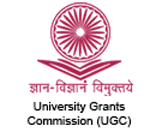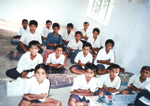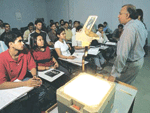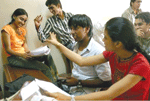UGC accepts pay hike, along with high teaching standards
 University Grants Commission has accepted the report of its Pay Review Committee after making some minor changes in its recommendations. Acknowledging that Readers in colleges/universities could have got a better deal, UGC made some changes in the pay band. It also emphasised that after the pay hike, universities will have to ensure high teaching standards. The recommendations will now be sent to the Ministry of HRD, which will consult the Finance Ministry before accepting the recommendations.
University Grants Commission has accepted the report of its Pay Review Committee after making some minor changes in its recommendations. Acknowledging that Readers in colleges/universities could have got a better deal, UGC made some changes in the pay band. It also emphasised that after the pay hike, universities will have to ensure high teaching standards. The recommendations will now be sent to the Ministry of HRD, which will consult the Finance Ministry before accepting the recommendations.
The UGC committee has recommended a minimum of 70% salary hike along with a host of increments and allowances to teachers. At the entry level, an assistant professor (earlier called lecturer) would get at least INR 5,000 more than a newly recruited IAS. The pay hike will be made effective from January 1, 2006. The committee has also recommended annual increment of 3% of the basic salary with compounding effect.
National Literacy Mission programme restructured
 The Ministry of Human Resource Development has redesigned the National Literacy Mission (NLM) to infuse new enthusiasm into it and check the declining rate of literacy. The restructured programme will be known as 'Lok Talim'. Taking inspiration from Mahatma Gandhi's 'Nai Talim', the new name represents India's composite culture as it is a combination of Hindi and Urdu words.
The Ministry of Human Resource Development has redesigned the National Literacy Mission (NLM) to infuse new enthusiasm into it and check the declining rate of literacy. The restructured programme will be known as 'Lok Talim'. Taking inspiration from Mahatma Gandhi's 'Nai Talim', the new name represents India's composite culture as it is a combination of Hindi and Urdu words.
The programme is likely to be implemented with the funding earmarked for Adult Education in the Eleventh Five Year Plan. Also physical structures will not be separately set up for the programme, it will use the existing primary school buildings or primary health care centres to conduct classes. There is also a provision of residential camps of four months duration for adolescents and weeklong residential camps for 10 months for self-help groups and panchayats to manage the programme.
DU teachers mull over semester viability
 Following the DU Academic Council's decision to obtain the views of teachers before introducing semesters at undergraduate level, teachers in colleges are weighing the viability of such a system. Though many see hurdles in the system and an increased workload, some do agree that semesters will have more benefits for students if the university provides sufficient logistical support. S K Chawdhury, who teaches English at Shri Ram College of Commerce, explained that 'a semester system is desirable as it would help integrate DU with other places making exchange programmes with foreign universities possible'.
Following the DU Academic Council's decision to obtain the views of teachers before introducing semesters at undergraduate level, teachers in colleges are weighing the viability of such a system. Though many see hurdles in the system and an increased workload, some do agree that semesters will have more benefits for students if the university provides sufficient logistical support. S K Chawdhury, who teaches English at Shri Ram College of Commerce, explained that 'a semester system is desirable as it would help integrate DU with other places making exchange programmes with foreign universities possible'.
Another teacher from a North Campus college believes that semesters will allow more number of papers in the course if exams are conducted every six months. However, he also added that teachers might oppose the new system as it would cause loss of time.
IGNOU conducts communicative English training for master trainers
 The Indira Gandhi National Open University's Distance Education Programme 'Sarva Sikshya Abhiyan (DEP-SSA) will hold workshops for master trainers in communicative English from October 16 till February 18 next year. Workshops are being held at Kerala, Delhi, Hyderabad, Bhubaneshwar and Bangalore. The DEP-SSA training module has been designed for resource persons who will tutor basic teachers and trainers working at the grassroot level.
The Indira Gandhi National Open University's Distance Education Programme 'Sarva Sikshya Abhiyan (DEP-SSA) will hold workshops for master trainers in communicative English from October 16 till February 18 next year. Workshops are being held at Kerala, Delhi, Hyderabad, Bhubaneshwar and Bangalore. The DEP-SSA training module has been designed for resource persons who will tutor basic teachers and trainers working at the grassroot level.
The workshops are aimed at enhancing the resource persons capacity in communicative English so that they can effectively impart training in English language to the trainers. The module has been enriched with such features as pronunciation, understanding and articulation of the language.
Primary education index highest for Kerela
Kerala is ranked first among the 21 major states in the latest composite Education Development Index (EDI) prepared for the primary and upper primary levels of schooling for 2006-07. Delhi comes second, followed by Tamil Nadu, Himachal Pradesh and Karnataka in the report, which was released by Ministry of HRD.
The report on the EDI was prepared by the National University of Educational Planning and Administration (NUEPA), based on the District Information System for Education (DISE), a comprehensive database on elementary education in India. The indicators used in computing the EDI included access, infrastructure, teachers and outcome. In the broader sense, 23 indices were used like number of schools per 1000 child population, average student-classroom ratio, pupil-teacher ratio, gross enrolment ratio and gender parity index. Bihar and Jharkhand are ranked 35 and 34 in the index with an EDI as low as 0.321 and 0.381 respectively.
Internal Assessment moderated in top DU colleges to bring parity The strategy to work hard for internal exams and score high marks has backfired for many Delhi University students. In a move meant to bring parity among colleges, the university has moderated the internal assessment marks of its students. So students in top-rung colleges like Sri Ram College of Commerce, Lady Sri Ram, Jesus and Mary College and St Stephen's have lost marks.
The strategy to work hard for internal exams and score high marks has backfired for many Delhi University students. In a move meant to bring parity among colleges, the university has moderated the internal assessment marks of its students. So students in top-rung colleges like Sri Ram College of Commerce, Lady Sri Ram, Jesus and Mary College and St Stephen's have lost marks.
Teachers across colleges are also questioning the basis on which marks have been moderated and have called for scrapping of the assessment. 'The university initially said there has to be parity between internals and theory paper. But now marks of all the students have been moderated irrespective of their performance,' said Jyoti Darbari, HoD, Mathematics at LSR.
Decline in spending on education by states
A recent study by the PHD Chamber of Commerce & Industry (PHDCCI) has revealed that the spending on education by various state governments has been declining over the last 12 years. The state governments' expenditure on education has dropped to around 18% of the total expenditure in 2007-08 from 20% in 1995-96. The inter-state differences in the per capita education spending are also widening. The per-capita fund flow to education in 2005-06 was INR 483 in Uttar Pradesh, INR 487 in Bihar, INR 1,034 in Maharashtra and Kerala and INR 1,777 in Himachal Pradesh.
'The educational infrastructure at the primary and secondary level is deteriorating due to a decline in the flow of funds to the education sector. There is an acute shortage of Government schools along with trained and motivate teachers, especially in the rural areas,' the study said. The study also suggested that the state governments need to spend more for maintenance of the existing infrastructural facilities.
Topperm launches inter-school online quiz
Curriculum-based TV channel, Topperm has launched a nationwide inter-school online quiz contest – 'Be a Winner@Topper' for students of 9th to 12th standards. Four subjects including Maths, Physics, Chemistry and Biology will be covered in the contest. The winner from each standard will receive INR 1 lakh as scholarship.
The schools represented by the winners will be awarded a 'Topper Experience Lab'.Robotics Workshop at Tech Institute The Netaji Subhash Institute of Technology (NSIT) in Dwarka organised Robokriti, a series of robotics workshops in collaboration with Technophilia Solutions, in Delhi on October 4 and 5.
Similar workshops were organised in Gwalior, Indore, PEC Chandigarh, Dehradun, and ITM Gurgaon between September and October.
The workshop focussed on four kinds of robotic technologies: wired robotics, i.e. robots controlled through switches; wireless robotics, where robots are remote controlled; computer controlled robotics and speech-controlled robotics. 'Speech Control' was an important aspect of the workshop, where technology that allows for controlling robots via spoken commands was showcased for the first time.
Varsities to now teach
N-lessons
India's 34-year nuclear isolation has ended. Following the nuclear deal with France and United States, educational institutions in the country are gearing up to address the needs of the manpower-deprived energy sector. Delhi University has already launched a three-year M.Tech course in Nuclear Technology this academic year. The Indian Institute of Technology – Madras, too, is planning to introduce a two-year course on similar lines.
 The IITs at Kanpur and Mumbai have been running such a course for a long time, but the response was tepid. 'The nuclear sector was confined to government set-ups such as the Department of Atomic Energy, where salaries were measly. But with the sector opening up to private participation, we expect the demand to rise,' said Professor Sanjay Dhande, director, IIT Kanpur.
The IITs at Kanpur and Mumbai have been running such a course for a long time, but the response was tepid. 'The nuclear sector was confined to government set-ups such as the Department of Atomic Energy, where salaries were measly. But with the sector opening up to private participation, we expect the demand to rise,' said Professor Sanjay Dhande, director, IIT Kanpur.
Add-on courses for students of Pune university
The University of Pune, along with Global Talent Track, announced a programme offering college students add-on courses that will help them understand the requirements of industry and make them 'industry-ready' when they graduate.
The programme will be initially rolled out in 100 colleges affiliated to the university and the number of students expected to enrol is 30,000, Vice Chancellor Narendra Jadhav said. It will offer orientation and training in the information technology enabled services segment that needs human resources in huge numbers. These will include banking and financial services, insurance and retail, Jadhav said. ![]()






















